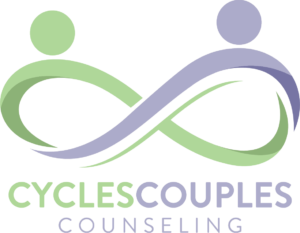Why can't we move past this??
At Cycles Couples Counseling, we frequently help couples that are longing to heal from past relationship injuries. These hurts to attachment bonds can present themselves most often as affairs or other betrayals. It’s harmful to feel your partner is not there in your time of need, or even worse, to know they sought comfort outside the relationship.
Healing is possible when both partners have a willingness to engage in the repair process. Below, you will explore the spectrum of hurts and the path to move forward.
Smaller Attachment Injuries
These are common in all relationships. In fact, they happen quite often. These can look like forgetting important dates, not paying attention, or even name calling in an argument. Often they are acute. Even though they may spark an argument or cause some tears, they generally do not lead to ongoing distance in your relationship.
Big Attachment Injuries
Unfortunately, some couples will sustain injuries far greater in scale. These betrayals often lead to trauma. This is very different than your normal hurt feelings. This is on the most extreme end of the emotional spectrum.
Trauma happens when a situation is so negatively overwhelming that it overcomes a person’s ability to cope. The results leave a person in a lonely and dire state. This often occurs in situations where people were meant to be protected and safe, but instead we're put in harms way. Events like this leave a scar.
A shock to the system like this can typically change the way you look at and interact with the world around you. Things like intrusive thoughts and lingering emotions can feel like they are following you around.
Normally people think of trauma in the Freudian sense—it’s all because of abuse and things that happened as a child in your relationship with your parents. However, it’s important to be clear: this can occur at any point in your life.
For adults, this often looks like infidelity, domestic violence, ongoing addiction and other situations with your partner that lack that perceived safety and security.
This sounds bad. How do we fix it?
As previously stated, healing is possible in couples therapy and therapists have helped many clients do just that. However, it is absolutely necessary that the threat be eliminated. It is very challenging to heal in the face of ongoing addictions, affairs or violence.
If a couple is willing to change these interactions to create a baseline of safety, they can learn to lean on each other more effectively and start the healing process.
It’s crucial to have a realistic view on healing. Clients often have views of what it “should” look like or how long it “should” take. Before your get too invested in these false beliefs, let’s clear a few things up!
Why are we still talking about this??
Frequently partners feel frustrated, surprised or even bewildered that their partner is still reeling from a past hurt. They underestimate the duration of the healing process.
Can we just move past this?
The affair happened years ago. Why do we have to keep bringing it up?
I can only apologize so many times. Can’t you get over it?
For some, this process is even more frustrating when triggers come up in times when you and your partner are enjoying yourselves and getting along.
Unfortunately this healing process isn’t a quick “on/off” button. It takes time and consistency.
How do we deal with all these triggers?
It can be overwhelming for the person who is healing from trauma. The slightest sensation can activate those past emotional memory banks and they can feel raw and vulnerable all over again. These can pop up anytime and often still feel very fresh. This hyper vigilant state isn’t pleasurable and it most definitely is not a choice.
Sometimes when your partner gets triggered you can feel panicked. On the outside this can look like defending, shutting down, getting angry or even trying to “Band-Aid” the problem. As you may have suspected, these responses do little to help comfort your partner. In fact, your impatience to eliminate the trigger can actually increase their negative emotional state.
The more you do things to try to make it stop or try to make it better, the more you are actually disconnecting from your partner and their feelings in the moment. As counterintuitive as it sounds, it’s important to actually lean into their bad feelings.
Can you validate them?
Do you understand how they got triggered?
What about this situation set off the alarms?
Questions like this help you join your partner in this scary place. You can use the safety of the relationship to quiet these alarms. After all, if you both got the message, there’s no purpose to keep the security alarms blaring.
But why does this keep happening?
Even after the incident has past, the memory remains. This hurt is part of your relationship history and it’d be a nearly impossible goal to try to wipe it away. This now has a crucial impact on your relationship dynamics.
If this relationship remains important, your body will need to have a system in place to make sure this hurt never happens again. Often times, this is where the triggers come into play.
Uh-oh! Does this mean we’re broken beyond repair?
No, this means you’re normal. Your body remembering sensational cues is actually a healthy response that is hardwired into your system for survival. This is far from a choice; it’s biology.
You subconsciously pay attention to things that can harm what’s important to you. This means your body begins to develop a specialized security system, if you will, to alert you to any moments where you could be in danger again. Anything that looks like, sounds like, smells like etc. is programmed to sound the alarms.
Your body is trying to cry out to tell you, “It’s happening again! Get ready!”
But it’s safe now, so why are you still getting triggered?
The downside of this built-in security system is that it’s pretty basic. You will probably get a lot of false positives.
Remember this doesn’t mean you’re not better or not healing. This doesn’t mean you messed up. These triggers are normal alerts your body has installed to keep you and your relationship out of harm’s way.
Sounds like this is more of their problem than mine.
Not so fast! You break it? You buy it. Just kidding, but actually, the person who hurt you is probably the best person to aid in the healing process. Through talking with your partner you can calm this automatic bodily response and reassure them.
Safety is the antidote. The more you can help your partner feel safe and connected when they are triggered, the more they can begin to quiet those alarms and heal from this hurt.
You’re right. This terrible deja vu feeling feels haunting and frustrating. However, counter intuitively, the more that you are able to validate and be with this feeling, the less intense it will be with your partner. You can be their anchor in this chaos and help them start to regulate.
Of course, it makes so much sense you’re triggered. It happened last winter around this time.
Yes, I get why this is popping up again. This is almost the same situation as before.
I can understand why sometimes the quiet times are actually hardest. It’s like the calm before a storm. Of course your body wants to prep for the worst-case scenario. You’re not used to this.
It’s horrible to be triggered, but it’s even worse to be triggered, judge it, and then feel bad about it. That’s a lot of negative emotional power layered on top of your partner. The more attention and acceptance you can give to these feelings, the less intrusive they will be.
Think of swimming in the ocean. It takes a lot less energy to ride with the waves than it does to resist the tide.
Recovery & Healing from Attachment Injuries
Unfortunately the security system may never be disabled. This is a basic part of human’s survival of the fittest biology. It’s a healthy response to stress.
However, with vulnerable and safe conversations with your partner you can turn down the volume and possibly even lessen the occurrence of these alarms.
Recovery from trauma isn’t the absence of triggers; it’s more the power over the reactivity. Finding a safe harbor with your partner can help shore up your relationship. It’s not your choice to be triggered. The only choice you have is in how you react together.
For more help on this healing process schedule an appointment today with Cycles Couples Counseling.
Learn more about Couples Therapy in California.

